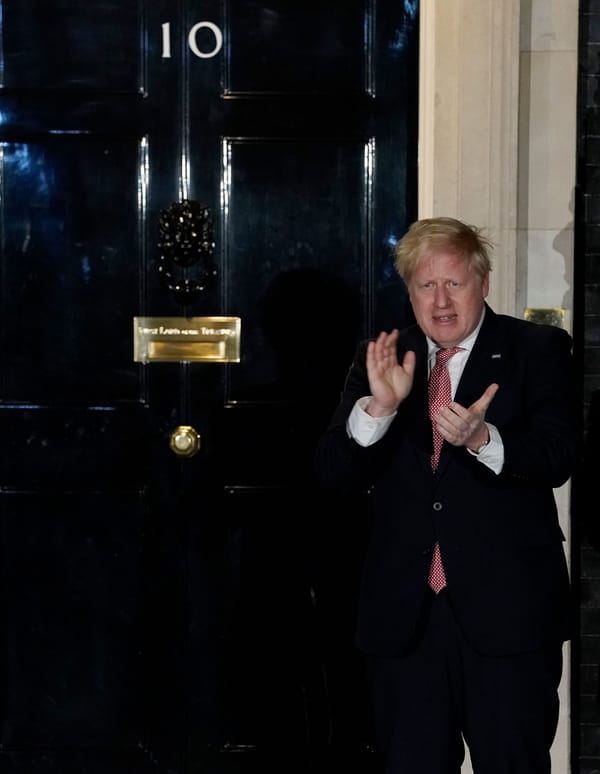Some called him a betrayer of Margaret Thatcher’s legacy, a near-socialist who exhibited a disgraceful lack of faith in free markets. Others denounced him as a dangerously regressive figure, with no interest in advancing the cause of LGBT rights. Still others warned of his terrifying effectiveness as a political operator, which threatened to overturn every convention of modern British politics.
Unfortunately, none of this was remotely true of Boris Johnson. Instead, as the premier very slowly departs No. 10 Downing Street, the overwhelming impression is of how pointless the whole thing was.
Even his greatest victory turned out to be empty: Having employed all his charisma, cunning, and brute force to get Brexit through—incidentally destroying the second-referendum campaign, the most annoying political movement in UK history—he had no clue what was supposed to happen next. Eventually, he appointed a “minister for Brexit opportunities,” seemingly in the hope of discovering what they might be.
“At some level, Johnson intuited that the moment had come for a new, post-Thatcherite, interventionist Toryism. But it never took shape as policy.”
Power Johnson loved. Governing the country, on the other hand, bored him. “This job,” he once sighed to his then-right-hand man Dominic Cummings, “it’s like getting up every morning [and] pulling a 747 down the runway.” All he wanted to do, he confided, was to write his book about Shakespeare. “I love writing,” he told Cummings wistfully. “I love it.”
At some level, Johnson intuited that the moment had come for a new, post-Thatcherite, interventionist Toryism. But it never took shape as policy. He would sometimes blurt out that the country was full of brilliant people whose potential was going unrealized, and that the government’s emphasis would be on “skills, skills, skills.” But the numbers being trained in new skills fell in Britain’s most deprived areas; one of the most successful nationwide skills programs, the Union Learning Fund, was shut down in an apparent act of anti-union spite.
He also talked a lot about “leveling up.” The current downturn isn’t all his fault. But the appalling scale of it—7 million households forced to skip essentials like heating or toiletries; Britons owing a total of £3.5 ($4.2) billion to high-cost lenders, including loan sharks—has demonstrated how little lay behind the slogan.
Perhaps the defining moment came during his speech last year at the Tory Party Conference. The government had recently decided to tackle the exceptionally tough issue of social care for the elderly. The current system burns through pensioners’ savings; standards of care are highly variable, care providers endure poverty wages and punishing conditions, the industry is being enthusiastically milked by private equity and hedge funds, and every one of these problems is likely to deepen as the population ages.
Johnson’s answer was to propose a new tax, which fell especially heavily on low-paid workers, with little explanation of how the money would be spent; indeed, it was doubtful how much of the revenue would go into the care system at all. This scarcely half-baked plan was presented as a magnificent solution. “I promised to fix this crisis,” he exulted. “And after decades of drift and dither, this reforming government … is going to get social care done.”
In that instant, you just knew the man wasn’t serious.
Johnson was the latest example of a recurring Tory tradition: the dramatic break with economic liberalism. Every few years, there is a new dawn, where it is said that the Conservatives are no longer free-market fundamentalists and are prepared to use the power of the state to strengthen families and communities. Every time—with Cameron’s “Red Toryism,” the “blue-collar conservative” movement, Theresa May’s communitarian-sounding 2017 manifesto—it comes to naught. At some point, you have to conclude that the party is simply institutionally Thatcherite.
Nor did Johnson resist the drift towards compulsory social liberalism. His proposed ban against “conversion therapy,” defined with culpable vagueness, may well open the way toward prosecutions of Christian clergy. He has also set in train a scheme to increase state surveillance of homeschooling and community schooling; one Jewish leader has said it could mean “expelling Orthodox Jewry from the United Kingdom.”
Meanwhile, we have his Shakespeare book to look forward to. Personally, I will immediately be looking up Macbeth in the index. It is the tale of a brilliantly gifted journalist—sorry, soldier—who, forgetting his true vocation, becomes intoxicated with power, and in the search for it destroys himself. Toward the end, he gloomily concludes that the whole story has been “full of sound and fury, signifying nothing.”
